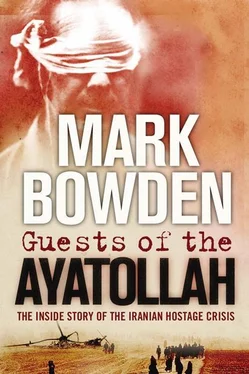The planners had also dispatched several of their members to tip off in advance a member of the Assembly of Experts, the body drafting Iran’s new constitution, and four more of the student leaders, Bitaraf, Mirdamadi, Siafullahi, and Asgharzadeh, had called on Mousavi Khoeniha, a young, black-bearded radical cleric whose preaching they admired. A slight man who spoke softly outside the pulpit, Khoeniha was considerably to the left of the conservative mullah establishment, and he was popular with the Islamist youth organizations at the universities who shared his more free-form, interpretive take on Koranic doctrine. Khoeniha immediately endorsed the idea of the takeover. He agreed with the planners that the devilish practices inside the U.S. embassy needed to be derailed, and that its emerging secret ties with the provisional government needed to be broken. The young cleric saw clearly that seizing the American embassy would also put great pressure on Prime Minister Bazargan and his government. They would be obliged to protect their American friends. Yet if the embassy was seized correctly, and by what was seen to be a group of pious, nonviolent youth allied to Khomeini, then it would make it virtually impossible for Bazargan to act without an order from the imam himself. The planners asked him to take their plan to Khomeini, but on this the radical mullah demurred. Why ask permission? In the years of building a movement against the shah, students and more radical clerics many times had successfully pressured the more powerful and moderate mullahs simply by acting without asking. Khomeini had a stake in preserving the provisional government; after all, he had appointed it. Asking him to approve an act that could topple it might invite disapproval. But if the embassy were occupied by his own professed supporters, and a large crowd was massed around the wall cheering them on, it would make it very hard, perhaps even impossible, even for the imam to oppose it, which would paralyze Bazargan and his traitorous administration.
The students had also secured the support of the Revolutionary Guards through Mohsen Razaee, one of the young leaders of that organization (he would become its head in two years). With the quiet backing of both the police and Razaee, they were confident that no authority would chase them from the grounds before they had a chance to seize the Americans and make a statement.
Everyone involved knew this could be a deciding moment in the revolution. If Khomeini condemned the takeover and ordered the students out of the embassy, it would signal his firm support for the provisional government and would likely mean that the clerical establishment would not directly run the state. If he supported the takeover, it would most likely collapse the Bazargan administration and the hopes of those who preferred at least some separation of church and state. To the students, the former course meant nothing less than total defeat, since they saw Bazargan as an American collaborator. They felt the weight of history and saw a chance to change the world.
Days after the plan was hatched, Khomeini gave a speech urging “all grade-school, university, and theological students to increase their attacks against America.” Asgharzadeh thought at first that the imam had been told of their plan and was signaling his support. He was elated, and then surprised and disappointed to learn from Khoeniha that the imam had not been consulted and knew nothing of the takeover plan. The remarks may have been coincidental, but they certainly suggested that Khomeini would support the assault.
Now, as Hashemi moved among the throng just blocks away from the embassy, he could see all the pieces coming together as planned. He would be one of the first through the gates. Abbas Abdi carried a loudspeaker from which he would issue the command to begin. Asgharzadeh was there too. He would stay back and try to make sure that those entering were members of his own group, and then see that the gates were locked behind them—if they were going to maintain control of the action they needed to prevent rival political organizations from storming inside. Mohammad Naimipoor had his large group of protesters assigned with forming a giant human ring around the chancery. Some of the chador-wearing women carried bolt cutters under their robes, for the chains on the gates, and also new chains and locks with which to secure the gates behind them. In addition to the laminated photos and armbands, all carried cards identifying their organization. Some carried the strips of cloth to bind and blindfold their American captives. It was both thrilling and daunting. Many saw the fine Aban rain that morning as heavenly approval, a symbol of Iran purifying itself, washing itself clean of its relationship with the Great Satan.
Hashemi’s concealed weapon was more to deal with rival factions than with the Americans. A short-lived takeover of the embassy in February had devolved into gunfights between competing militias. The students had decided that their assault would be strictly nonviolent. They would not harm the Americans, even if they opened fire. But there was also a chance things would get out of control. Would the marines shoot? If they did, and the bloodied bodies of martyrs were passed out to the crowd, what would happen then?
Walking down the wide corridor that ran the length of the chancery’s second floor, John Limbert mapped out his day in hopes of finding an hour to slip out for a haircut. He was on his way to the meeting that officially began each workday at the embassy. The second secretary in the political section, he had been traveling the week before in southern Iran, and it occurred to him that his thick brown hair, which now fell over the tops of his ears, must look pretty shaggy.
Ordinarily Limbert did not attend the morning meeting, which was chaired by the acting ambassador, Bruce Laingen, the chargé d’affaires, and included the various embassy departmental heads. Today he had been invited to sit in for his boss, First Political Secretary Ann Swift, who was coming in late. Everyone was eager to hear about his swing through the cities of Abadan and Shiraz. Limbert was an ambitious foreign service officer, but about him there was nothing pushy or abrasive. He was a loose-limbed, affable man with a narrow face and a nose so ample, starkly framed by dark-rimmed glasses above and by a heavy brown mustache below, that it ruled his face. Behind stylish, lightly tinted lenses were the playful eyes of an intensely curious and fun-loving soul. The loose cut of his suit advertised that he had lived primarily outside of the United States in recent years. This assignment to Iran had been ideal for him, one for which he was particularly well suited. He had spent years in the country, first in the Peace Corps and later as a teacher working on his doctorate in Middle Eastern studies, and he spoke Farsi so well that when he wore locally made clothes he passed for Iranian. That wasn’t necessarily a good thing in an American embassy, where there was an institutional suspicion of foreign service officers who had “gone native,” but Iran was suddenly of utmost importance in Washington, and Limbert’s set of skills and experience was rare. He had been at this job for only a few months and was still conscious of making the right impression. He wished he’d gotten the haircut earlier.
Limbert was one of two political officers who worked with Swift. The other was Michael Metrinko, whom Limbert had known before this assignment. Metrinko had partly learned his Farsi from Limbert’s Iranian wife, Parvaneh, who had taught him when he was a Peace Corps volunteer; she considered him to have been her best student. Along with the head of that section, Victor Tomseth, who was also acting deputy chief of mission, these three were among a very small number of fluent Farsi-speaking Iran experts in the State Department. With their years in the country and language skills, they were prized sources of information in the embassy, which even at its highest levels was filled with newcomers. Limbert, Tomseth, and Metrinko formed an especially sharp contrast to the three-man CIA station, which had no Farsi speakers and a combined experience in Iran of fewer than five months. This tour was a chance for all three to shine. Because they could read the local newspapers, listen to the radio and TV, and talk to a wide variety of Iranians, they were the only ones with a real feel for the place.
Читать дальше












